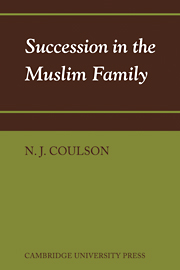Book contents
- Frontmatter
- Contents
- Introduction
- 1 Family ties as grounds of inheritance
- 2 Priorities in inheritance
- 3 Primary heirs
- 4 Substitute heirs
- 5 Secondary heirs
- 6 Grandfather and collaterals in competition
- 7 Succession by the outer family
- 8 Inheritance in Shīʻī law
- 9 Reforms in the traditional system of priorities
- 10 Dual relationships
- 11 Impediments to inheritance
- 12 Conditions of inheritance
- 13 Bequests
- 14 The limits of testamentary power
- 15 Death-sickness
- Index
11 - Impediments to inheritance
Published online by Cambridge University Press: 30 March 2010
- Frontmatter
- Contents
- Introduction
- 1 Family ties as grounds of inheritance
- 2 Priorities in inheritance
- 3 Primary heirs
- 4 Substitute heirs
- 5 Secondary heirs
- 6 Grandfather and collaterals in competition
- 7 Succession by the outer family
- 8 Inheritance in Shīʻī law
- 9 Reforms in the traditional system of priorities
- 10 Dual relationships
- 11 Impediments to inheritance
- 12 Conditions of inheritance
- 13 Bequests
- 14 The limits of testamentary power
- 15 Death-sickness
- Index
Summary
In its strict technical sense an impediment to inheritance is a personal act or attribute which disqualifies from succession an individual who would otherwise be an entitled heir on the ground of either marriage or blood relationship with the praepositus. Three such causes of disqualification are recognised by contemporary Islamic law – homicide of the praepositus by the heir, a difference of religion between the heir and the praepositus, and a difference of domicile between the heir and the praepositus.
Slavery
Under traditional Sharīʿa law the status of slavery constituted a further impediment to inheritance, since the slave, as a general rule, was not capable of owning property. But the rule clearly has no practical relevance today, and for this reason was omitted from the bars to succession listed in the Egyptian Law of Inheritance, 1943. It is noteworthy, however, that the relevant section of that law begins with the words: “Among the impediments to inheritance are…”; and this form of words, according to the Explanatory Memorandum to the law, was deliberately used to indicate that the terms of the section were not exhaustive, “lest it might be thought that the purpose of the omission [of slavery as an impediment] was to change a rule of the Sharīʿa which was the subject of a consensus of all Muslims”.
Illegitimacy
Although there are no mutual rights of inheritance between a father and his illegitimate child, illegitimacy is not, technically, an impediment to inheritance in the same way as homicide or difference of religion.
- Type
- Chapter
- Information
- Succession in the Muslim Family , pp. 172 - 194Publisher: Cambridge University PressPrint publication year: 1971
- 1
- Cited by



